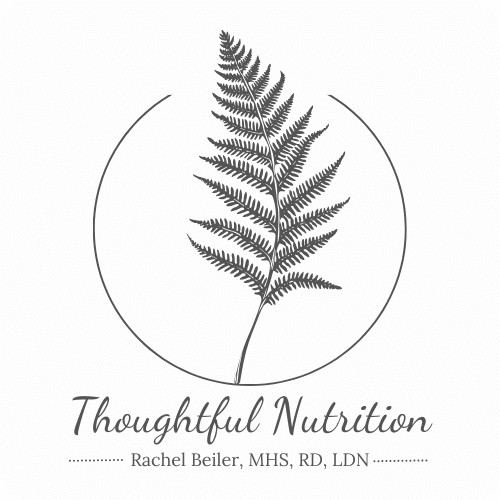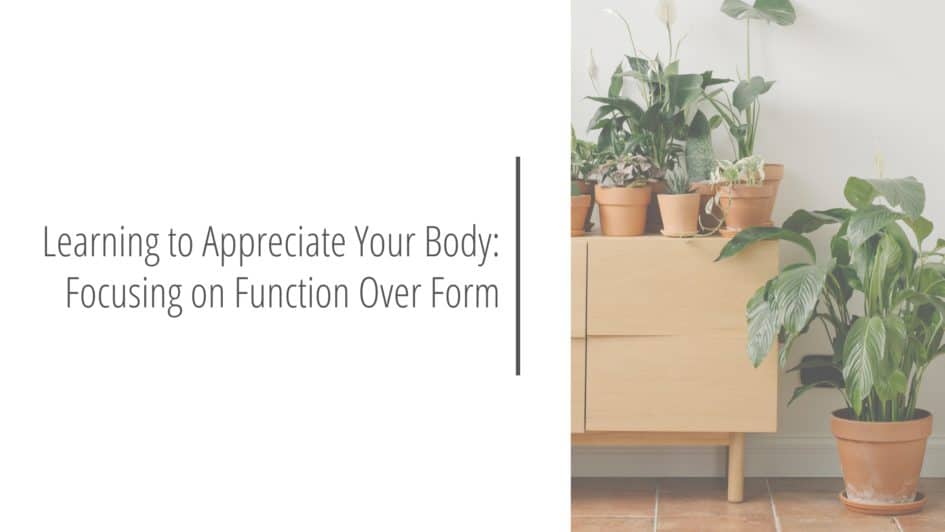Table of Contents
Function Over Form
Learning to appreciate your body through the amazing things it does, (not for how it looks, but for how it functions) can help you grow toward a more positive body image. When we start viewing our bodies as powerful, resilient systems rather than something to be judged or changed, we begin to foster a healthier, more compassionate relationship with ourselves.
Our bodies are incredibly intricate, and when we take the time to recognize their complexity, it becomes clear just how remarkable they truly are. Every day, our bodies carry out countless biological functions that keep us alive, healthy, and thriving, yet we often overlook these wonders. Instead, we become fixated on a number on the scale, a pant size, or how our bodies look in the mirror.
This mindset shift is key to moving away from the harmful weight-focused ideals and towards a more healthy, compassionate perspective.
The Marvels of Our Anatomy
I think a great way to view our bodies is to think about the different components and how they work simultaneously to keep us alive and thriving. This helps put into perspective just how intricate and complex the body truly is. Embracing this perspective can help you learn to appreciate your body.
The Heart
Your heart beats approximately 100,000 times a day to keep you alive. Over an average lifespan, that’s over 2.5 billion beats! The circulatory system is so efficient that the blood vessels, if stretched end to end, would span thousands of miles. This continuous, life-sustaining process is happening without you even thinking about it.
The Nose
Did you know that your nose can detect over a trillion different smells? This sense of smell helps us observe and respond to our environment, contributing to the richness of life and giving us the ability to experience the world in ways we often take for granted.
The Digestive System
The digestive system contains its own nervous system, which is made up of approximately 100 million neurons, which is more than the spinal cord. This allows our gut to operate almost independently, signaling when we’re hungry or full, without our conscious input. It’s an incredibly complex system that goes well beyond digestion alone.
The Liver
Your liver filters around 1.4 liters of blood every minute, detoxifying harmful substances from your body. Not only does it process toxins, but it also stores vital nutrients like iron and vitamins, plays a crucial role in regulating blood sugar, and helps produce bile for digestion.
The Skeleton
Your skeleton is made up of 206 bones, which are far stronger than you might think. For instance, the femur (thigh bone) is stronger than concrete. Your bones protect vital organs, provide structure, and support all movement, making them an essential part of your daily life.
The Skin
The skin is the body’s largest organ. It does so much more than just protecting us from the outside world, it regulates temperature, protects against pathogens, and helps to retain moisture. Plus, it regenerates itself every 28 to 30 days.
The Brain
The brain contains approximately 86 billion neurons. These neurons create trillions of synaptic connections every second, allowing us to think, feel, remember, and perform tasks. This complex network is responsible for everything from basic bodily functions to complex thoughts and emotions.
The Immune System
Your immune system is constantly working to defend you from harmful invaders, such as bacteria and viruses. It can detect pathogens and respond appropriately, even remembering previous threats to prevent reinfection. It’s a sophisticated defense network that’s always on guard, working tirelessly to keep you healthy.
The Kidneys
The kidneys filter over 50 gallons of blood every day. They help remove waste and excess fluids, regulate electrolytes, and play a role in controlling blood pressure. Despite their small size, they are vital in maintaining balance in the body, and they do all this without us needing to consciously manage them.
Muscles and Strength
The human body contains over 600 muscles, all of which work together to help us move, lift, and perform daily tasks. Some muscles, like the heart, never stop working, and others provide the strength needed for walking, running, and even smiling. Your muscles are an essential part of not just physical strength, but emotional well-being as well.
Why This Matters
The body is capable of so much more than we often give it credit for. While society has conditioned us to equate value with body size and external appearance, it’s important to remember that the true marvel of beauty lies in what our bodies are constantly doing behind the scenes.
The heart beats over 100,000 times a day to keep us alive, while our skin protects us from the outside world, regenerating and healing itself every month. The liver filters toxins from our bloodstream, and our muscles help us perform countless actions, from walking to laughing.
Yet, these incredible feats are rarely acknowledged when we focus solely on the number on the scale or our physical appearance. When we shift our focus from superficial standards to the amazing things our bodies accomplish every day, we begin to see that body image is about far more than just what we look like.
It’s about what we do, how we move, and the vitality we carry within us. Learning to appreciate all that our bodies do can help us break free from harmful beauty ideals and embrace a more empowering, holistic view of our own worth. This outlook can start you down the path of learning to appreciate your body.
The Role of Mental Health in Body Appreciation
Learning to appreciate your body involves not only recognizing the physical marvels inside but also acknowledging how important mental health is. The way we think about our bodies deeply influences how we treat them. Focusing on self-compassion and practicing mindfulness are two powerful tools that can help shift our perspective.
When we approach our bodies with kindness, rather than criticism, we open the door to healing and self-acceptance. It’s not just about changing how we see our physical appearance; it’s about shifting our mindset to focus on gratitude for what our bodies do for us every day.
The way we talk to ourselves and the thoughts we allow to define our sense of worth can have a huge impact on our mental well-being. Negative body image often leads to harmful cycles of comparison, perfectionism, and self-judgment. By prioritizing mental health, we begin to nurture our bodies in a way that promotes holistic health.
When we make space for self-compassion, we start to let go of the unrealistic expectations we place on ourselves. The act of truly appreciating your body for what it is and what it does doesn’t just improve your mental outlook; it supports your physical well-being too.
Shifting Away From the Scale
When we become fixated on the scale, we risk ignoring the incredible work our organs, muscles, and systems are constantly doing behind the scenes. The heart beats tirelessly to circulate blood, the lungs bring in oxygen to fuel our cells, and the digestive system works to absorb the nutrients needed for energy and growth.
Yet, society often equates health and beauty with a specific number, leading us to believe that our worth is tied to our weight. This narrow focus can cloud our perception and prevent us from truly appreciating all that our bodies do for us every day.
None of these vital functions are reflected in a number on the scale. Additionally, weight alone doesn’t account for mental health, emotional well-being, or the strength and mobility that allow us to engage with the world around us.
Placing too much emphasis on weight can also create a negative cycle of self-judgment, leading to restrictive eating habits, over-exercising, or even giving up on health goals altogether when the scale doesn’t show the desired number.
But when we shift our focus away from the scale, we open ourselves up to a more holistic approach to health. We begin to value how our bodies feel, how they move, and how they support us in our daily lives. This perspective helps you learn to appreciate your body for its strength, resilience, and functionality, rather than just its appearance.
By celebrating all that our bodies do, we can move away from the limiting narratives that tie our value to our weight. This shift not only promotes a healthier relationship with our bodies but also empowers us to live fuller, more joyful lives, unburdened by the constraints of unrealistic beauty standards.
Final Thoughts
Our bodies are extraordinary. From the heart’s tireless beats to the brain’s complex neural connections, the human body performs countless miracles every day, many of which go unnoticed. When we take the time to recognize and appreciate these marvels, it becomes clear that our worth is not defined by a number on a scale or by how closely we align with societal beauty ideals.
Learning to appreciate your body for its incredible functions rather than its appearance can help cultivate a more positive body image. It encourages us to shift our focus from superficial standards to a deeper understanding of our bodies’ complexity and resilience. By doing so, we can move away from the limiting narratives that tie our value to our weight and instead celebrate our bodies for all they do.
This journey of appreciation and acceptance isn’t always linear, but it’s a crucial step toward building a more compassionate relationship with ourselves. When we honor our bodies, not for how they look but for how they carry us through life, we can start to form a healthier relationship with them.
Your body is your home, a powerful system working every second to support you. Embrace it, appreciate it, and remember that its value goes far beyond appearance.
Thanks for reading!
Rachel Beiler, MHS, RD, LDN


Leave a Reply